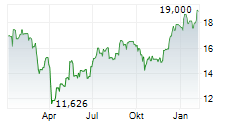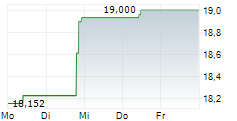By Mike Walters, KeyBank Executive Vice President, President of Business Banking
CLEVELAND, OH / ACCESS Newswire / May 27, 2025 / Most small business owners are chief everything officers. Even when outsourcing or hiring to fill needs, their hands run deep in operations, finance, marketing, technology, and sales. Consequently, some meaningful relationships go underdeveloped-including the important relationship between small business owner and bank.
It's not that small business owners don't value their bank. Most do. Rather, for time-crunched owner-operators, the relationship is transactional. The bank is home to their accounts and the place to deposit and withdraw money. It's where they turn to access capital and loans. For some, the bank is even a resource for managing cash flow. Yet for many, the bank-and by extension their banker-is not a trusted business advisor. It should be.
Conversations lead to more targeted solutions
At the close of 2024, there were nearly 4,000 FDIC-insured banks in the U.S. Most offer a range of similar solutions. Even rates and terms tend not to vary dramatically.
So, what differentiates one bank from another? What makes a bank feel more than simply a checking or savings account?
The answer is simple. It is the relationship. It is a banker understanding the specific demands of a business and being able to provide much-needed advice and a tailored solution to a unique problem to achieve a specific outcome to help the business run better.
In addition to being the wearer of many hats, business owners are experts in their trade. Often times, that expertise is not financial.
But that's where business bankers come in. Their knowledge equips them to address a range of complex scenarios. From a knowledge of products that may improve efficiency and profitability to experience helping address a host of financial challenges, business bankers can offer advice and expertise that small business owners neither have themselves nor can easily access.
Examples include payments and receivables, invoicing, liquidity management, process automation, and fraud protection. Business bankers are also well versed in cash flow management-the lifeline of every successful enterprise.
The challenge is that financial operations is a bridge typically not crossed together. And this is a mistake, for the business…and the bank. In fact, the shift to a more consultative approach to business banking falls more on the bank than the business. Banks thrive when their clients thrive. Helping business owners understand how the money flows through their operation and where there may be opportunities to benefit from managing their collection and payable processes differently creates opportunities for all.
Of course, this starts with conversations and building a relationship.
Transforming the relationship between business and bank
Banks realize differentiation is about more than the products and solutions they offer. Differentiation is about changing the relationship from transactional to consultative.
KeyBank, for example, has launched a Certified Cash Flow Advisor Program. The program empowers business owners to navigate their financial operations by providing them with a highly trained advisor who can work with them holistically across the business to reduce friction, improve efficiency, and identify and act on opportunities for growth.
This advice-driven approach goes beyond traditional banking and offers strategic insights that help owner-operators make informed decisions to reach their financial goals. It puts small business owners first and product-driven solutions second.
This is as it should be. If business owners view their banks only through the lens of product catalogs to navigate and choose from, banking is just another ball to juggle and hat to wear.
Conversations that matter
Small business owners are accustomed to facing more challenges than their larger counterparts-the impact of COVID-19, high-interest rates, and tariffs are recent examples. Yet what makes small businesses vulnerable-size and scope-is also their strength. Typically free from the red tape and stakeholder interests, they can be nimbler and more quickly embrace innovative practices.
Here are some conversations small businesses should be having with their banks.
Assessing the health of the business. What are concerns? How are payments?
Exploring ways to improve cash flow. Capital is extremely valuable. Are business operations insulated from supply chain disruption? Can the business pivot to invest in technology to streamline operations?
Addressing workforce challenges. Banks can offer a platform of benefits and specialized products to attract and retain employees.
Small businesses are the backbone of our economy. As the challenges continue to grow, there is no doubt they are up to the challenge. And with greater commitment from banks to collaborate more than sell, small businesses are equipped for greater resiliency and success.
About the author: Mike Walters is an Executive Vice President and President of Business Banking at KeyBank. He can be reached at michael_r_walters@keybank.com
This is designed to provide general information only. All credit products are subject to collateral and/or credit approval, terms, conditions, availability and subject to change. ©2025 KeyCorp. All rights reserved. CFMA #250521-3232428

View additional multimedia and more ESG storytelling from KeyBank on 3blmedia.com.
Contact Info:
Spokesperson: KeyBank
Website: https://www.3blmedia.com/profiles/keybank
Email: info@3blmedia.com
SOURCE: KeyBank
View the original press release on ACCESS Newswire:
https://www.accessnewswire.com/newsroom/en/banking-and-financial-services/deeper-bank-relationships-can-elevate-small-businesses-1032194



